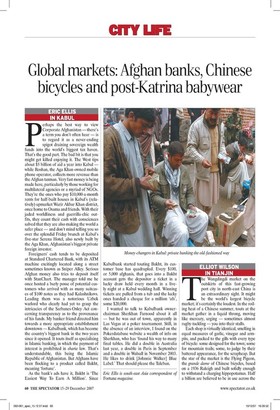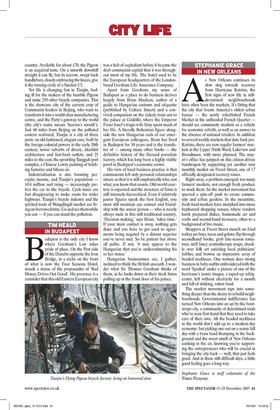Global markets: Afghan banks, Chinese bicycles and post-Katrina babywear
HERM perhaps the best way to view Corporate Afghanistan — there's a term you don't often hear — is to regard it as a never-ending spigot draining sovereign wealth funds into the world's biggest tax haven. That's the good part. The bad bit is that you might get killed enjoying it. The West tips about $5 billion of aid a year into Kabul — while Roshan, the Aga Khan-owned mobile phone operator, collects more revenue than the Afghan taxman. Very fast money is being made here, particularly by those working for multilateral agencies or a myriad of NG0s. They're the ones who pay $10,000-a-month rents for half-built houses in Kabul's (relatively) upmarket Wazir Akbar Khan district, once home to Osama and friends. With their jaded worldliness and guerrilla-chic outfits, they count their cash with consciences salved that they are also making the world a safer place — and don't mind telling you so over the splendid Friday brunch at Kabul's five-star Serena Hotel, also newly built by the Aga Khan, Afghanistan's biggest private foreign investor.
Foreigners' cash tends to be deposited at Standard Chartered Bank, with its ATM machine excitingly located along a street sometimes known as Sniper Alley. Serious Afghan money also tries to deposit itself with StanChart. The manager told me he once hosted a burly posse of potential customers who arrived with as many suitcases of $100 notes as they had Kalashnikovs. Leading them was a notorious Uzbek warlord who clearly had yet to grasp the intricacies of the Sarbanes-Oxley Act concerning transparency as to the provenance of his funds. My banker friend directed him towards a more appropriate establishment downtown — Kabulbank, which has become the country's biggest bank in the two years since it opened. It touts itself as specialising in Islamic banking, in which the payment of interest is prohibited in sharia law. That's understandable, this being the Islamic Republic of Afghanistan. But Afghans have been flocking to a product called Bakht, meaning 'fortune'.
As the bank's ads have it, Bakht is 'The Easiest Way To Earn A Million'. Since Kabulbank started touting Bakht, its customer base has quadrupled. Every $100, or 5,000 afghanis, that goes into a Bakht account gets the depositor a ticket in a lucky draw held every month in a lively night at a Kabul wedding hall. Winning tickets are pulled from a tub and the lucky ones handed a cheque for a million `afs', some $20,000.
I wanted to talk to Kabulbank ownerchairman Sherkhan Farnood about it all — but he was out of town, apparently in Las Vegas at a poker tournament. Still, in the absence of an interview, I found on the Pokerdatabase website a wealth of info on Sherkhan, who has 'found his way to many final tables. He did a double in Australia last year, a double in Paris in September and a double in Walsall in November 2003. He likes to drink [Johnnie Walker] Blue Label.' That should please the Taleban.
Eric Ellis is south-east Asia correspondent of Fortune magazine.
ELLIOT WILSON IN TIANJIN The Wangdingdi market on the outskirts of this fast-growing port city in north-east China is an extraordinary sight. It might be the world's largest bicycle market; it's certainly the loudest. In the roiling heat of a Chinese summer, touts at the market gather in a liquid throng, moving like mercury, urging — sometimes almost rugby-tackling — you into their stalls.
Each shop is virtually identical, smelling in equal measures of garlic, vinegar and armpits, and packed to the gills with every type of bicycle: some designed for the town; some for mountain trails; some, to judge by their battered appearance, for the scrapheap. But the star of the market is the Flying Pigeon, the grande dame of Chinese bicycles, based on a 1936 Raleigh and built solidly enough to withstand a charging hippopotamus. Half a billion are believed to be in use across the country. Available for about £70, the Pigeon is an acquired taste. On a smooth downhill straight it can fly, but its narrow, swept-back handlebars, closely embracing the knees, give it the turning circle of a Sinclair C5.
Yet life is changing fast in Tianjin, boding ill for the makers of the humble Pigeon and some 250 other bicycle companies. This is the showcase city of the current crop of Communist leaders in Beijing, who want to transform it into a world-class manufacturing centre, and the Party's gateway to the world (the city's name means 'heaven's mouth'). Just 60 miles from Beijing on the polluted eastern seaboard, Tianjin is a city of three parts: an old-fashioned, elegant core, built by the foreign colonial powers in the early 20th century; newer suburbs of dreary, identikit architecture and fast-food outlets; and 25 miles to the east, the sprawling Tangguh port complex, a Chinese Lowry painting of belching factories and bilious air.
Industrialisation is also boosting percapita income, and Tianjin's population — 10.4 million and rising — increasingly prefers the car to the bicycle. Cycle-lanes are fast disappearing to make room for wider highways. Tianjin's bicycle industry and the spirited touts of Wangdingdi market are living on borrowed time. Go and see them while you can — if you can stand the pollution.
TIM HEALD IN BUDAPEST Budapest is the only city I know where Gresham's Law takes pride of place. On the Pest side of the Danube opposite the Iron Bridge, in a niche on the front of what is now the Four Seasons Hotel, stands a statue of the propounder of 'Bad Money Drives Out Good'. His presence is a reminder that this old Eastern European city was a hub of capitalism before it became the drab communist capital that it was throughout most of my life. The hotel used to be the European headquarters of the Londonbased Gresham Life Assurance Company.
Apart from Gresham, my sense of Budapest as a place to do business derives largely from Brian Maclean, author of a guide to Hungarian customs and etiquette (published by Culture Smart) and a convivial companion on the rickety train out to the palace at Godo110, where the Emperor Franz Josef's tragic wife Sissy spent much of her life. A literally Bohemian figure alongside the new Hungarian suits of our emergent European colleagues, Brian has lived in Budapest for 30 years and is the translator of — among many other books — the definitive history of the Herend porcelain factory, which has long been a highly visible jewel in Budapest's economic crown.
His view of local business practice is that communism left only personal relationships intact, so that it is still emphatically who, not what, you know that counts. Old-world courtesy is expected and the structure of firms is still intensely hierarchical. Even if relatively junior figures speak the best English, you must still maintain eye contact and friendship with the senior person — who is nearly always male in this still-traditional country. `Decision-making,' says Brian, `takes time.' If your main contact is away, nothing gets done and you have to get used to agreements being negated by a distant superior you've never met. So be patient but above all polite. If not, 'ft may appear to the Hungarian that you're underestimating his or her status.'
Hungarian businessmen are, I gather, inclined to think the British uncouth. I wonder what Sir Thomas Gresham thinks of them, as he looks down at their sleek limos pulling up at the front door of his palace.
STEPHANIE GRACE IN NEW ORLEANS As New Orleans continues its slow slog towards recovery from Hurricane Katrina, the first signs of new life in stilldevastated neighbourhoods have often been the markets. It's fitting that the city that boasts America's oldest urban bazaar — the newly refurbished French Market in the unflooded French Quarter — should see community markets as a vehicle for economic rebirth, as well as an answer to the absence of national retailers. In addition to several weekly markets that date back preKatrina, there are now regular farmers' markets in the Upper Ninth Ward, Lakeview and Broadmoor, with more planned. The mayor's office has jumped on this citizen-driven bandwagon by supporting yet another new monthly market on Freret Street, one of 17 officially designated recovery zones.
Right away, a problem emerged: too many farmers' markets, not enough fresh produce to stock them. So the market movement has spurred a spin-off push to create community and urban gardens. In the meantime, fresh-food markets have morphed into more haphazard shopping venues, where vendors hawk prepared dishes, homemade art and crafts and second-hand treasures, often to a background of live music.
Shoppers at Freret Street munch on fried turkey po-boys, tacos and gelato; flip through secondhand books; grab late-season tomatoes; sniff fancy aromatherapy soaps; chuckle over folk art satirising local politicians' foibles; and browse an impressive array of beaded necklaces. One woman does strong business in baby outfits embroidered with the word 'Spoiled' under a picture of one of the hurricane's iconic images, a taped-up refrigerator, left without electricity for a month and full of stinking, rotten food.
The market movement taps into something deeper than the desire to rebuild neighbourhoods. Governmental indifference has turned New Orleans into an up-by-the-bootstraps city, a community of determined souls who've seen first-hand that they need to take care of their own. All the beaded necklaces in the world don't add up to a modern-day economy: but picking one out on a sunny fall day with a brass band thumping in the background and the sweet smell of New Orleans cooking in the air, knowing you're supporting the entrepreneurs who will be crucial in bringing the city back — well, that just feels good. And in these still-difficult days, a little good feeling goes a long way.
Stephanie Grace is staff columnist of the Times-Picayune.


































































































 Previous page
Previous page